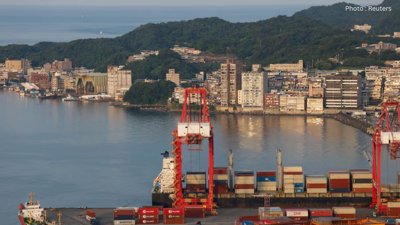
Post by : Shivani
Global shipping leaders are demanding a complete overhaul of the United Nations-backed deal governing ship fuel emissions, arguing that the current framework under the International Maritime Organization (IMO) falls short of tackling climate change at the speed and scale necessary.
With the maritime sector accounting for nearly 3% of global greenhouse gas emissions, industry giants including Maersk, MSC, and Hapag-Lloyd are now pushing for tougher regulations, clearer enforcement mechanisms, and ambitious decarbonization targets. They claim the current UN ship fuel emissions strategy is outdated and lacks the teeth to drive real change.
At the heart of the debate is the IMO’s revised strategy adopted in 2023, which aims to reach net-zero emissions from shipping “around 2050.” While this was hailed as a step forward by some nations, environmental groups and several top-tier shipping companies argue that the plan is non-binding, lacks clarity, and leaves far too much room for interpretation.
Industry executives are calling on the IMO to move beyond aspirational goals and commit to binding rules that would mandate the use of low- and zero-emission fuels. They also want more transparent carbon pricing, global incentives for green shipping technologies, and stricter compliance protocols to ensure all countries and carriers operate under the same climate standards.
Shipping leaders emphasize that without an aggressive and enforceable shift in UN ship fuel emissions policy, the sector risks missing key climate milestones outlined in the Paris Agreement. They argue that investment in green fuel infrastructure—such as ammonia, hydrogen, and methanol refueling capabilities—cannot proceed without a stable and globally accepted emissions framework.
In a joint statement submitted to the IMO this month, 17 of the world’s largest shipping and cargo companies outlined five critical demands:
Set an absolute cap on shipping emissions starting 2030
Enforce a global carbon levy on marine fuels
Phase out fossil-based marine fuel by 2040
Standardize emissions reporting across all ports and fleets
Create a Green Shipping Fund to finance the transition in developing nations

These recommendations follow recent studies showing that the maritime sector is behind on its decarbonization pathway. According to the International Council on Clean Transportation, emissions from international shipping could rise by 15% by 2035 without stricter regulations.
Part of the issue lies in the structure of the IMO, which operates under the UN and requires consensus among its 175 member states. Nations with large shipping interests or heavy fossil fuel dependencies, such as China, Saudi Arabia, and Brazil, have historically resisted binding climate mandates—preferring softer, incentive-based frameworks.
Meanwhile, European Union regulators have moved forward independently. From 2024, the EU will include maritime emissions in its Emissions Trading System (ETS), effectively pricing carbon from large ships calling at European ports. This patchwork of regional policies has raised fears of market fragmentation, where some carriers face stricter climate rules than others, undermining global competitiveness.
Shipping firms argue that the only way to avoid this regulatory chaos is through a unified and enforceable UN ship fuel emissions strategy. “We need one global rulebook for one global industry,” said Henrik Andersen, climate policy lead at Maersk. “Otherwise, we’ll spend the next two decades chasing compliance, not decarbonization.”
The shipping sector is currently experimenting with several decarbonization options. Maersk has ordered dozens of methanol-fueled vessels, while Japan’s NYK Line is investing in ammonia propulsion. But most of these technologies are in their early stages and require multi-billion-dollar investments in fueling infrastructure, port retrofits, and new vessel designs.
Without regulatory certainty, investors remain cautious. That’s why the push for an overhaul of the UN ship fuel emissions agreement is not just an environmental appeal—it’s a business necessity.
Supporters of reform also note that a well-structured emissions deal could unlock economic opportunities. The rise of green maritime fuel production could benefit countries with access to renewable energy and coastal infrastructure. Similarly, ports that adopt early green standards could become global logistics hubs in a low-carbon economy.
Critics of the current IMO approach argue that the 2050 net-zero goal, while rhetorically ambitious, lacks interim targets. “A goal without a pathway is a wish,” said one EU official attending the recent Marine Environment Protection Committee (MEPC) meeting.
A clearer emissions roadmap would also align the sector with broader net-zero policies. Many countries and companies have already pledged to reach net-zero emissions by 2050 across all sectors. Without shipping playing its part, the global economy could face a “logistics emissions gap.”
For ongoing coverage of international climate policy, shipping regulations, and energy transition developments, readers can visit Armust News, which regularly features updates from the IMO, UNFCC, and global maritime forums.
In the coming months, the IMO will hold further negotiations to finalize details of its revised climate strategy. Reform advocates hope the next round of talks will prioritize enforceable measures, binding commitments, and inclusive financing for poorer nations.
As one senior industry executive noted, “Shipping has the opportunity to lead by example. But we can’t navigate the future with yesterday’s map.
UN Fuel Policy, Shipping Emissions, IMO 2023, Maritime Climate Deal, Green Shipping, Global Shipping News, Emissions Overhaul, Carbon Levy Shipping










Advances in Aerospace Technology and Commercial Aviation Recovery
Insights into breakthrough aerospace technologies and commercial aviation’s recovery amid 2025 chall

Defense Modernization and Strategic Spending Trends
Explore key trends in global defense modernization and strategic military spending shaping 2025 secu

Tens of Thousands Protest in Serbia on Anniversary of Deadly Roof Collapse
Tens of thousands in Novi Sad mark a year since a deadly station roof collapse that killed 16, prote

Canada PM Carney Apologizes to Trump Over Controversial Reagan Anti-Tariff Ad
Canadian PM Mark Carney apologized to President Trump over an Ontario anti-tariff ad quoting Reagan,

The ad that stirred a hornets nest, and made Canadian PM Carney say sorry to Trump
Canadian PM Mark Carney apologizes to US President Trump after a tariff-related ad causes diplomatic

Bengaluru-Mumbai Superfast Train Approved After 30-Year Wait
Railways approves new superfast train connecting Bengaluru and Mumbai, ending a 30-year demand, easi